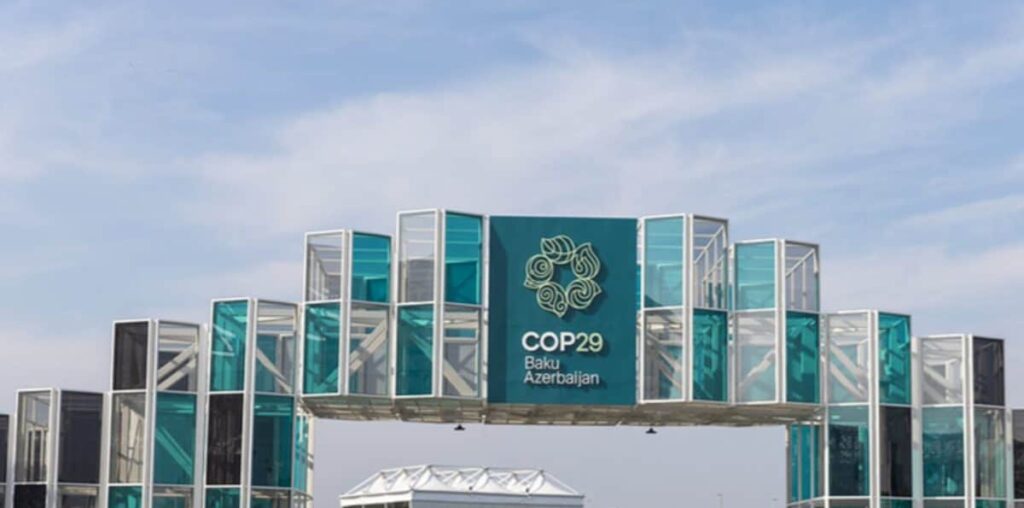Last Updated:
Disappointed by the talks so far, developing country blocs, united in their demand, declared that they will continue engaging until the very last minute

The 2024 United Nations Climate Change Conference or Conference of the Parties of the UNFCCC, more commonly known as COP29, is the 29th United Nations Climate Change conference. COP29 is being held in Baku, Azerbaijan, from November 11 to 22, 2024. Image: UN Climate Change Conference
As the COP29 negotiators entered the final hours to prepare a draft outcome, developing country blocs came out united on Wednesday to demand a strong trillion-dollar climate finance deal at the UN summit.
“We need a figure in trillions, as the headline of the text. Then we can discuss the rest of the issues. But that figure is critical. It is imperative for developed nations to step up,” said Adonia Ayebare, the Ugandan chairman of the G77+China grouping of developing nations.
Speaking at a press briefing in Baku, the largest group of developing nations, led by G77+ China, along with the African group, as well as the Like-Minded Developing Countries (LMDCs), firmly declared that the provision of climate finance is a legal obligation of developed countries under the UN Framework Convention on Climate Change (UNFCCC).
“Climate finance is not charity. Providing finance is a legal obligation of developed countries to developing nations. That is why this COP is really important, and we need an outcome that strongly agrees to a consistent, clear figure in terms of the new finance target,” asserted Diego Pacheco from Bolivia on behalf of the LMDCs.
‘Renegotiation of Paris Agreement unacceptable’
The developing nation blocs made it clear, quite strongly, that there was no scope for re-negotiating the 2015 Paris Agreement, which clearly stipulates that developed countries provide financial resources to developing countries, which are more climate-vulnerable. This comes in the wake of calls by a few developed nations to expand the contributor base to include certain developing countries based on their wealth and GDPs.
“The New Collective Quantified Goal (NCQG) should be grounded in the mandate of the 2015 Paris Agreement. We are very concerned over the attempts to introduce innovative elements, or change the mandate of the Agreement to dilute the responsibility of developed countries. There are also attempts to impose targets on developing countries with no provision of finance,” said the Bolivian delegate on behalf of LMDCs.
G77+China, however, said it is open to looking at another layer of “voluntary contributions” to the new climate finance target.
‘Disappointing progress so far’
Disappointed by the lack of clarity on the finance target, the developing nation blocs highlighted that they have already specified their climate finance needs in trillions, but the developed countries lack plans and political will, and continue to undermine the negotiation process.
The two-week-long UN summit has entered its crunch time to establish a New Collective Quantified Goal (NCQG) to replace the previous $100 billion target set by the rich nations in 2009. Developing nations have proposed at least $1.3 trillion every year till 2030 to be mobilised by developed countries through grants, concessional finance, and non-debt-inducing support. However, the rich nations are holding their cards close to their chest, and are yet to propose any figures.
“We expected some direction on the NCQG by now, but there is still no confirmation on the quantum of finance we asked for. We have been pushing for the last ten days, but there has been no movement, no figure until now. This is disappointing and frustrating. We hope that our partners will come forward with a justifiable number to meet the needs and scale of the growing problem of climate change,” said Kenya’s climate envoy Ali Mohamed, representing the African Group.
Developing countries are at the forefront of climate change impacts, despite contributing the least to the historical emissions. United in their demand, the blocs stated that they would continue engaging positively until the last minute, in the face of an unexpected outcome. “We are here to negotiate in good faith. It is too premature to be talking about walking out,” added Mohamed.

